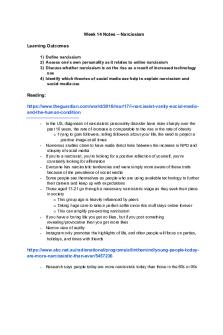Class 14 Notes - Egyptian mythology. Contest between Horus and Seth. Dr. Frame PDF

| Title | Class 14 Notes - Egyptian mythology. Contest between Horus and Seth. Dr. Frame |
|---|---|
| Course | Introduction to Mesopotamian Civilization |
| Institution | University of Pennsylvania |
| Pages | 4 |
| File Size | 58.7 KB |
| File Type | |
| Total Downloads | 23 |
| Total Views | 157 |
Summary
Egyptian mythology. Contest between Horus and Seth. Dr. Frame...
Description
March 27th -
Kings are stewards of the gods and representatives of his people
-
Osiris myth is a justification for kingship and the fact that the kingship moves from father to son and not brother to brother - Whole stress of the myth even though the whole story is a satire
-
What was the point of Isis have some brotherly love for Seth when Seth is trying to usurp from her son Horus?
-
??? has sex with Seth to show his domination over him ??? - ??? gets Seth to lie down at night and has sex with him
Reading: Gods in the Desert, Contest Between Horus and Seth -
Osiris is passive, does nothing other than die and everyone else scatters/resurrects/gathers him - On the other hand, Horus is active in asserting his right to the throne and plotting against Seth
-
Horus and Seth form a duality - Horus as god of Lower Egypt represents order - Seth as god of Upper Egypt represents disorder - The duality exists within a greater harmony: depicted together tying the heraldic plants of Upper and Lower Egypt around the hieroglyph representing unity
-
Isis plays big role, her powerful magic hides Horus, her maternal devotion is a big part of her divine identity - Horus and Isis represented as divine mother and son
-
Central issue is the royal succession, once Horus is a teenager he approaches the gods and says he is the legitimate royal successor of his father Osiris but Seth disputes his claim to the throne and seeks it for himself - The gods support Horus but Ra withholds his consent, favoring Seth because he thinks Horus is too inexperienced to rule - They defer to goddess Neith, the primeval mother who “created the seeds of gods and men” and who is mother of Ra
-
-
She writes a letter urging the gods to give Horus his right to be king, but also advises Ra to compensate Seth for his loss of the throne by giving him Ra’s daughters Anat and Astarte The gods accept this but Ra demurs and denounces Horus, he is berated by god Bebon and Ra retreats Ra’s daughter Hathor visits him and moves Ra to laughter by lifting up her skirts and exposing herself, Ra then allows the case to continue
-
Seth and Horus make their respective cases - Seth bases his on his virility and great strength - Horus bases his on his being Osiris’s son - Isis demands recognition of Horus’s rights but Seth refuses to continue with her present - Ra agrees and moves the proceedings to an island where Isis can’t access, but she disguises herself as an old woman and bribes a ferryman to carry her across the river - She uses her magic to disguise herself again as a young woman who excites Seth’s lust, telling him she is a widow whose son’s rights and properties have been usurped and asks for help - Seth is angry that she suffered such injustice and Isis changes herself into a kite and tells Seth he has unwittingly condemned himself - Seth complains to Ra about Isis’s deception, but he is not sympathetic - The proceedings are moved to the mountains and Horus is crowned king
-
Seth challenges Horus to a series of feats of skill, strength, and cunning - A series of contests, soon becomes clear that the idea in each contest is not only for one god to prove himself as superior but to humiliate the other - Each god tries to shame the other so completely that he will be a totally unacceptable choice for king - Isis and Horus mostly work together against Seth
-
At one point Isis hits Seth with her harpoon and injures him but heals him when he cries out to her - This act of kindness infuriates Horus so he decapitates her - The gods take revenge against Horus, Seth finds him and gouges out his eye - Hathor magically heals Horus, his eyes become identified with the moon and the sun Ra orders Seth and Horus to make peace - Seth uses the opportunity to invite Horus to a banquet where he attempts to sexually humiliate Horus but Isis again intervenes, her magic makes it backfire
-
and Seth is sexually humiliated instead -
More contests, a series of victories for Horus and losses and humiliations for Seth, who uses force and threats when he doesn’t get his way with the council of the gods - Problem of the succession is only solved when Osiris intervenes (Thoth was prompted by Ra to write him a letter in the underworld explaining it all) - Osiris reminds Ra tht Osiris is the god responsible for making earth fertile and that it is thus not a good idea to deprive his son Horus of his rightful throne - Ra is hesitant so Osiris resorts to threats, as he has demons at his command - The gods submit to Osiris’s will and give the kingship to Horus - Seth becomes Isis’s prisoner and renounces his claim, Ra compensates by giving him his daughters and a job worthy of his strength: he will stand guard and protect Ra from Apophis, the snake monster of disorder, during daily trip
-
Proper outcome of the story is never in doubt: Horus is meant to be king as legitimate son of Osiris - Implicit opinion of both the storyteller and ancient audience, reinforced explicitly throughout the story - What is most important in the story is not Horus’s fitness to become king, but his legal and moral right as the firstborn son to inherit his father’s throne - Story is an assertion of the right of royal inheritance in the face of assassination, coup, and war
-
When Osiris is murdered, the divine world is in and turmoil and conflicts follow - Only when Horus takes throne do maat, order, and justice return
-
Also a mythic account of battle between order and disorder, of autocratic kingly authority and the threat of social unrest - Once he becomes king Horus finds a fitting place for Seth in a well-ordered cosmos as a virtile warrior - Horus is master over all created things, even the power of disorder
-
Kings are the sole beneficiaries of gods’ gifts to them as rulers - The nation benefits from the gift but it is for the king’s sake, not the nation’s
-
Instruction for Merykara: instruction for Merykara on how to conduct himself in personal matters as well as in matters of government - Be benevolent, behave in ways that garner respect, be just, show mercy - Kings should build monuments for the gods and serve them as their priest - Provide for the needs of the nation: defend borders, prize good officials,
-
promote the best men without partiality Obliterate all traitors (elimination of memory is the worst punishment, loss of any part in the world to come)
-
Testament of Amenemhat: model for the good king, from Amenemhat I - Reminiscent of Hamlet - Amenemhat’s reign was distinguished by his oversight and preparations for the future, but the unfortunate circumstances of his death led him to warn his son Senusret to be on guard against those around him, trust no one
-
Both these works offer advice from a king to his son - Message is that the king must be just, pious, show benevolence to gods and his subjects, secure the nation from enemies, especially traditional enemies from the north and the south - Greatest threat comes not from open enemies but treacherous friends
-
Reason for impression of peace and serenity found in the art and architecture of ancient Egypt: graphic representation of the peace the earthly kings worked so hard to secure - The history of royal rule in Egypt was sometimes filled with conflict but it was most important that royal monuments showed the Two Lands the benefits of the peace that would ultimately prevail - Reflect the unchanging reality that was believed to lie behind each king’s reign, as the tumultuous changes and chances of history were subsumed into a portrayal of the peaceful reign of the eternal divine monarch
Reading: Myth of Illuyanka -
-
Storm god Teshub/Tarhunt was defeated by the water snake - In one story his daughter Inara, goddess of wilderness, helps him by sleeping with a man named Hupasiya who then bound the snake when Inara invited the snake/kids to dinner, and Tarhun killed the snake - In the other story Teshub creates a son with the daughter of a poor man then marries him into the snake’s family, who requested their heart and eyes (?) Variants of the mythical battles between light and dark, order and chaos, fertility and natural disaster, in which a heroic male battles a snake or dragon - Theme of humans used as pawns by the gods...
Similar Free PDFs

Chapter 14 - class notes
- 4 Pages

Chapter 14 class notes
- 15 Pages

Class 14 - Lecture notes 2
- 1 Pages

Greek Mythology Notes
- 3 Pages

Pandas Data Frame Notes
- 10 Pages

Grave Goods- Egyptian Amulets
- 3 Pages

Corr Chp 14 Notes - Dr. Kim
- 2 Pages

Mythology AND Folklore
- 12 Pages

Frame Relay and its Architecture
- 14 Pages
Popular Institutions
- Tinajero National High School - Annex
- Politeknik Caltex Riau
- Yokohama City University
- SGT University
- University of Al-Qadisiyah
- Divine Word College of Vigan
- Techniek College Rotterdam
- Universidade de Santiago
- Universiti Teknologi MARA Cawangan Johor Kampus Pasir Gudang
- Poltekkes Kemenkes Yogyakarta
- Baguio City National High School
- Colegio san marcos
- preparatoria uno
- Centro de Bachillerato Tecnológico Industrial y de Servicios No. 107
- Dalian Maritime University
- Quang Trung Secondary School
- Colegio Tecnológico en Informática
- Corporación Regional de Educación Superior
- Grupo CEDVA
- Dar Al Uloom University
- Centro de Estudios Preuniversitarios de la Universidad Nacional de Ingeniería
- 上智大学
- Aakash International School, Nuna Majara
- San Felipe Neri Catholic School
- Kang Chiao International School - New Taipei City
- Misamis Occidental National High School
- Institución Educativa Escuela Normal Juan Ladrilleros
- Kolehiyo ng Pantukan
- Batanes State College
- Instituto Continental
- Sekolah Menengah Kejuruan Kesehatan Kaltara (Tarakan)
- Colegio de La Inmaculada Concepcion - Cebu






